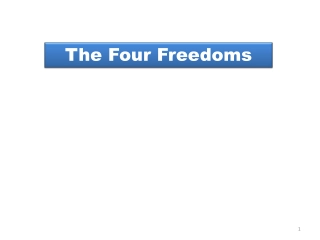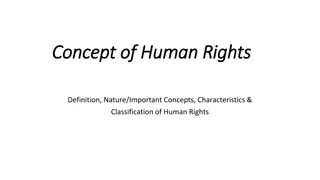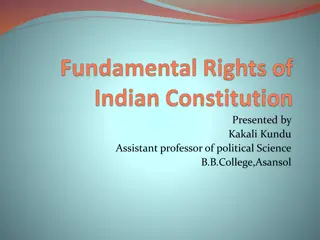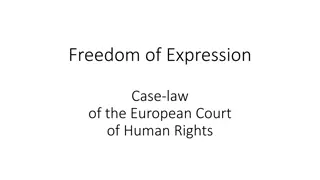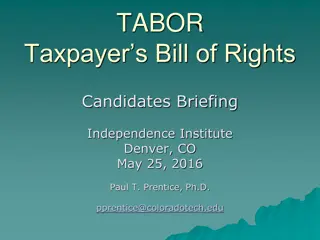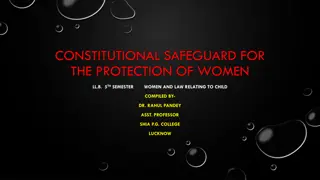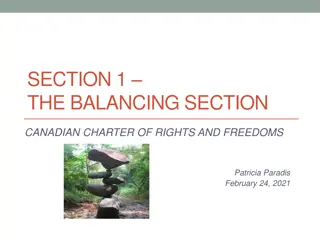Rights and Freedoms in the U.S.
"Discover the importance of rights and freedoms in the United States, explore the Constitution's Bill of Rights, and learn about the 1st Amendment and its significance in protecting fundamental liberties. Gain insights into the foundation of democracy and the protection of individual freedoms against government interference."
Download Presentation

Please find below an Image/Link to download the presentation.
The content on the website is provided AS IS for your information and personal use only. It may not be sold, licensed, or shared on other websites without obtaining consent from the author.If you encounter any issues during the download, it is possible that the publisher has removed the file from their server.
You are allowed to download the files provided on this website for personal or commercial use, subject to the condition that they are used lawfully. All files are the property of their respective owners.
The content on the website is provided AS IS for your information and personal use only. It may not be sold, licensed, or shared on other websites without obtaining consent from the author.
E N D
Presentation Transcript
What if The government made a new law that said people cannot say anything negative about the government, or anyone in the government? Or what if... There was a new law that said if you break the law, no matter what law you broke, you must wear a hat for one year in public that says: I am a criminal ? Yikes.
Good news: The government cannot make laws like that. People in the United States have certain rights and freedoms. We the People
Today, you are going to explore rights and freedoms. Let s get started!
Step 1: Look at page 1 in your packet. This is where you will write your observations about sources. Step 2: Work with your partner to examine the four sources. Look closely, think about what you see, and write questions you have about the sources. After you examine the sources, we ll take a look at the U.S. Constitution s Bill of Rights.
Now that you have analyzed the sources, let s look at some more rights and freedoms. The United States Constitution is the law of the land. The Constitution has a Bill of Rights. These rights protect people from being treated unfairly by the government. See if you can find any of the four freedoms from your sources in the Bill of Rights.
1st Amendment 1st Amendment Freedom of Expression Freedom of Expression Religion Religion Separation of church and state Free exercise of religious beliefs Speech Speech Assembly Assembly & & Petition Petition Press Press
Which of the four freedoms from your sources did you find in the 1st Amendment? What other rights are in the 1st Amendment?
2nd Amendment 2nd Amendment Keep and bear arms. Keep and bear arms. Well regulated militia 3rd Amendment 3rd Amendment Quartering of Soldiers Quartering of Soldiers 4th Amendment 4th Amendment Search and Seizure Search and Seizure
5th 5th Amendment Amendment Indictment by Grand Jury. No double jeopardy. Due process of law. Just compensation. Don t have to testify against yourself. 6th Amendment 6th Amendment Speedy, public trial. Impartial jury. Informed of accusation. Witnesses: Right to an attorney. Confront those against you. Have your own.
7th Amendment 7th Amendment Jury trial for civil case. Jury trial for civil case. (at least $20) (at least $20) 8th Amendment 8th Amendment No excessive bail, fines. No excessive bail, fines. No cruel or unusual No cruel or unusual punishment. punishment.
9th Amendment 9th Amendment These rights are not the only rights we have. 10th Amendment 10th Amendment Powers not delegated by the Constitution are reserved for the states and the people. We the People The founders included in the Constitution a rule stating that it could be amended, or changed. Over time, people and attitudes have changed, and new amendments have been added to protect the rights of all citizens.
13th Amendment 13th Amendment(1865) Outlaws slavery. 14th Amendment 14th Amendment (1868) All people born or naturalized in the U.S. are citizens. All citizens must be treated equally under the law. Due process of law for all. 15th Amendment 15th Amendment(1870) Right to vote cannot be denied based on race, color, or previous servitude. Sometimes called the Civil War Amendments. And later... 19th Amendment 19th Amendment(1920) Women s right to vote.
We found freedom of speech and worship in the 1st Amendment. What about the other two freedoms from your sources? Do you think those freedoms should be included? Can you think of any other rights or freedoms that should be included?
Instructions 1. In your group, think about rights or freedoms that are important to you, but are not in the Bill of Rights. 2. Narrow your list down to the ONE right or freedom that is MOST important. Reach consensus by sharing ideas and listening to each other. 3. Propose your new amendment to the Bill of Rights! 4. Be prepared to say what your amendment is and why it is important to Americans.


